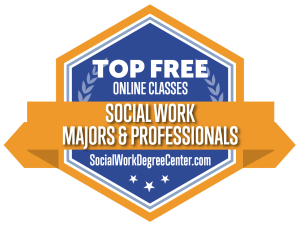
These top online free courses for Social Work majors and professionals cover a range of topics relevant to the social work profession. In years past, educators and professional organizations looked down on online social work courses.
Methodology to Determine the Best Free Classes Available Online for Social Work
Basing our rankings on several criteria helps give you a more complete picture of each class. So, not only can you evaluate courses based on their overall score, but on their individual metrics as well.
Not all free classes online for social work are made alike. Some free online trainings for social workers aren’t worth your time at all. But, others are worth their weight in gold! That’s where our rankings come in. To help narrow down the field of online free classes for social work you might take, we use our three-part methodology to rank courses. Let’s review each of these criteria our analytics team uses to make sure our data is accurate.
Related:
- How to Become a Certified Social Work Case Manager (C-SWCM)
- Health Care Social Work Specialization in Accelerated MSW Programs
- How to Become a Certified Hospice and Palliative Social Worker (CHP-SW)
- How to Become a Certified Advanced Children, Youth, and Family Social Worker (C-ACYFSW)
Flexibility
- Highly flexible: 2 points
- Moderate flexibility: 1 point
- Low flexibility: 0 points
Accessibility
- High accessibility: 3 points
- Moderate accessibility: 2 points
- Low accessibility: 1 point
Learning Level
- Advanced: 3 points
- Intermediate: 2 points
- Beginner: 1 point
Flexibility
Free free online social work courses should offer you the flexibility to learn when you have the time. As a student or as a working professional, you already have a lot on your plate. So, taking the initiative to further your understanding of social work shouldn’t require adjusting your already busy schedule.
Some free classes online for social work are completely self-paced. This means you have the flexibility to learn whenever you like. Others offer a more directed approach and might have set times to “meet” online with your teacher or work with your classmates.
This factor is scored as such:
- Highly flexible: 2 points
- Moderate flexibility: 1 point
- Low flexibility: 0 points
Accessibility
You might think that all online free classes for social work are highly accessible. This just isn’t the case. Some courses offer more accessible features than others.
For example, some free classes offer you downloadable assets so you can learn even if you are without an internet connection.
As another example, some online courses allow you to connect to the class on your computer, smartphone, or even your TV.
Furthermore, some courses offer more features and assets than others that make online learning an easier and more productive process.
This factor is scored as such:
- High accessibility: 3 points
- Moderate accessibility: 2 points
- Low accessibility: 1 point
Learning Level
The learning level of the online classes for social work is perhaps the most important feature. You need to take courses that meet you at your current skill level.
In our rankings, more advanced courses are ranked higher. This isn’t because lower-level courses don’t have value. Quite the opposite. However, advanced courses tend to be more in-depth on specific topics. This is in contrast to beginner courses that cover many different topics but not much in-depth.
Because of the increased rigor of advanced courses, we rank free classes according to the following scale:
- Advanced: 3 points
- Intermediate: 2 points
- Beginner: 1 point
Again, this isn’t to say that beginner courses don’t have a lot of value. They do! But advanced courses offer the chance to learn more job-ready skills. They also allow you to demonstrate a deeper understanding of the content than an introductory course. For this reason, advanced courses get the most points.
Our editors first ranked free online courses in October 2022. This ranking was updated December 2024.
1. Social Welfare Policy and Services

This is an advanced course from the University of Michigan. The best online social work class is available on edX. This class is for practicing social workers that want to deepen their knowledge of social welfare policy.
This class is broken down into four areas of study:
- The philosophy of social welfare policy
- The history of social work
- Current social welfare policies in the U.S.
- Social work theory, trends, and debate
- Community services
- social justice
The knowledge and skills you learn in this course are applicable to the major fields of social work service. This includes child welfare, mental health, and health care, among others.
The curriculum was devised by the University of Michigan. This course is part of Michigan’s Social Work: Practice, Policy and Research MicroMasters program. The program is available on edX. This course is free. If you want to get the MicroMasters, there are fees involved.
Additionally, there is a certification available, but it requires a $199 fee.
Points: 8
Flexibility: Highly flexible. This course is self-paced. There is a lot to learn in the course. However, lessons are short and easily completed in one sitting.
Accessibility: Highly accessible. This course is available immediately upon enrollment. All course materials are available online. There are video transcripts to accompany each lesson as well.
Learning Level: Advanced
2. Social Work: Research

This advanced course was developed by the University of Michigan. It is offered by edX. Its focus is on conducting effective research in social work. Additionally, you’ll learn how to use evidence-based practice in providing services to clients.
There is a lot of research in the field of social work. Learning how to conduct research is critical. Learning how to be a good consumer of research is also important.
In this top free class for social work, you will learn how to:
- quantitative research methods
- qualitative research methods
- Use proper search procedures to find existing research
- provide community services
- social justice
You will also learn how to apply current research to practice. This includes learning how to apply what research has found. It also includes how to better understand what research has not yet discovered.
This course is part of Michigan’s Social Work: Practice, Policy and Research MicroMasters program. This program is available on edX. This individual course is free. However, edX’s MicroMasters requires you to pay a fee.
Points: 8
Flexibility: Highly flexible. Each lesson is relatively short. This enables you to complete lessons quickly if needed. The course is self-paced, so you can take as much time as you need.
Accessibility: Highly accessible. Once you enroll, you get immediate access to the class. In addition to text-based lessons, there are also video lessons. The video lessons include transcripts too.
Learning Level: Advanced
3. The Social Context of Mental Health and Illness

This mixed-level course was developed by the University of Toronto. It’s available on Coursera. It is a great option for learners that are interested in the social factors of mental health.
The course begins with a brief history of mental health. This includes discussions on how mental health is defined and the causes of mental illness. From there, you’ll explore topics related to the following:
- The social context of diagnosis and treatment of mental illness
- How one’s culture influences mental health
- Family connections and how they can improve mental health recovery
- community services
- social justice
Likewise, this course examines the social aspect of mental health. This includes a discussion of how to get communities to support improved mental health services for people of all ages.
This course requires about 16 hours of study time to complete. It’s broken into five units of study, each one week in length.
Points: 7
Flexibility: Highly flexible. This is a self-paced course. You can set and reset deadlines as needed throughout the class.
Accessibility: Highly accessible. This class is 100 percent online. You have immediate access to course files upon enrollment. You can view the course on a computer or other connected device.
Learning Level: Intermediate
4. Becoming a Critical Social Work Practitioner

This is an advanced course from OpenLearn. It is designed for people who already have social work experience. Students should have a desire to learn more about critical social work practice.
This course has three parts. Each part focuses on essential skills needed for critical care. This includes:
- Understanding critical practice
- Practicing constructive social work
- How to use language to develop social work relationships
- community services
- social justice
Once you finish this course, you will have the knowledge needed to practice professional discretion in a social work relationship. Likewise, you’ll have improved skills that will help you deliver social work services in a timely and caring fashion.
This online social work course will also help you understand the complex relationships that exist in social work environments. This includes ties between the social worker and their client. It also includes influences of justice, care, and control.
There are 15 lessons in this course. There are also downloadable resources for your benefit.
Points: 6
Flexibility: Highly flexible. You can learn as slowly or as quickly as you want in this self-paced course.
Accessibility: Highly accessible. All course materials are easily available online without registering for an account.
Learning Level: Advanced
5. Child Protection: Children’s Rights in Theory and Practice

This online social work course was developed by Harvard University and is offered for free on edX. It is a beginner course that focuses on the failures of child protection and the effects of those failures.
The class is taught by Jacqueline Bhabha, Research Director of the Harvard FXB Center for Health and Human Rights. Along with other Harvard faculty members and social work practitioners, she will present ideas to solve these systemic failures. Specifically, you’ll learn about:
- Child protection laws around the globe
- Strategies to prevent child abuse
- The emotional effects of child abuse
- Strategies for improving the child protection system
- community services
- social justice
You will also examine the relationship between children and the needs of law enforcement. This includes children that are in conflict with the law. It also includes migrant children that might come in contact with law enforcement.
Most students can complete this course in about 16 weeks. You can take as much or as little time as you need, though.
Points: 6
Flexibility: Highly flexible. Learn at your own pace. The course requires between two to six hours of work each week. With short lessons, you can easily finish individual lessons in a few minutes’ time.
Accessibility: Highly accessible. All course materials are readily available online. The class is open as soon as you enroll. There are also transcripts of the video lessons to help you learn.
Learning Level: Beginner
6. Addiction Treatment: Clinical Skills for Healthcare Providers

Many social workers specialize in addiction treatment. This beginner course from Yale University will help you begin to prepare to be an addictions therapist.
The course begins with an explanation of how you can screen clients for substance abuse risk. Likewise, you’ll gain insights into diagnosing clients’ substance abuse disorders.
Other topics of study in this class include:
- manage treatment plans for clients with substance abuse disorders
- prevent substance abuse disorders from developing
- provide compassionate care to clients with substance abuse disorders
- social justice
One of the interesting parts of this class is that you get to see model cases performed by actors. This helps you see substance abuse therapy play out.
This is a six-week course. Most students are able to finish it in about 14 hours of direct study time.
Upon finishing this online social work class, you can get a certificate of completion. A certificate requires you to pay a fee, though.
Points: 6
Flexibility: Highly flexible. This class allows you to work at your own pace. You can adjust the due dates in the class based on your schedule.
Accessibility: Highly accessible. This course is offered completely online. Upon enrollment, you have immediate access to the course so you can start learning right away.
Learning Level: Beginner
7. Social Services for Families, Seniors and Those with Disabilities

This beginner course is offered by Columbia University. It is available on Coursera. Enrollment is free.
The free online social work class offers insights into the services provided for vulnerable populations. More specifically, you’ll look at the types of support services available to social work clients.
For example, you’ll learn about the process families must go through to become eligible for social welfare programs.
Additionally, you’ll explore topics related to:
- The need for child care and family leave for poor families
- The American Disabilities Act
- Social services programs for seniors, like Medicare
- social justice
You will also have the chance to develop your own policy proposals. These proposals will address common problems for at-risk populations. For example, you might draft a proposal outlining how to offer free childcare for single working mothers.
This course requires about 15 hours of work. It is self-paced, so you can complete the required assignments as you wish.
Points: 6
Flexibility: Highly flexible. Learn at your own pace. You can set and reset deadlines as needed to fit your schedule.
Accessibility: Highly accessible. Upon enrollment, all course materials are available online. Learn any time of day or night, 365 days a year.
Learning Level: Beginner
8. An Introduction to Social Work

This beginner course for social work is from OpenLearn. Courses on OpenLearn are provided for free by The Open University.
This is a comprehensive course. It is designed specifically for students just beginning to learn about social work. You’ll explore critical topics that include:
- Social work theory
- Ethical social work practice
- Advocating against oppressive practices and policies
- Social Justice
Additionally, you’ll learn basic ways to make social work practice more individualized. This includes self-reflection and evaluating the kinds of people that benefit from social work services.
You’ll also learn what it means to do reflective practice. Engaging in self-reflection allows you to better understand the process of using social work theories. It also assists you in becoming more self-aware. This course requires about 15 hours of work to complete. The lessons are quite short. This makes it easier to quickly finish individual lessons.
Points: 6
Flexibility: Highly flexible. This is a completely self-paced course. Learn at your leisure or your availability to do so.
Accessibility: Highly accessible. You can access this course without enrolling. There are downloadable resources to help further your learning as well.
Learning Level: Beginner
9. Psychology 104: Social Psychology

This free course is from Study.com. It is a common core course for undergraduate studies in social work. This course offers a detailed overview of social psychology. This includes a detailed look at the major perspectives in social psychology. You’ll also learn about the seven themes of social psychology.
Other topics of study include:
- Research methods
- Ethical practice
- Attitudes and persuasion
- Prejudice and discrimination
- social justice
Additionally, you can expect to learn about the relationship between your self-concept and society at large. In other words, you’ll be able to see how social norms and social comparisons influence how you perceive yourself.
This online class for social work includes ten chapters of study. There are 100 lessons, each of which is about eight minutes in length. Each lesson includes an exam to test your knowledge.
Points: 6
Flexibility: Highly flexible. This is a self-paced course. You can complete as many lessons in one sitting as you like. Or you can take as long as you like.
Accessibility: Highly accessible. You can begin exploring the course materials without enrolling in the class. All course materials are available online for easy access.
Learning Level: Beginner
10. Restorative Justice and Practice: Emergence of a Social Movement

An important part of a social worker’s job is advocacy. This is often done for people that have had interactions with law enforcement.
This online social work course is from edX. It was created by the Victoria University of Wellington. The free class focuses on the restorative justice movement. Specifically, you’ll learn how these initiatives have been used to create better criminal justice systems.
Additional learning topics include:
- restorative justice began
- How restorative justice is used in educational systems
- restorative justice is used in welfare systems
- social justice
You’ll also learn about restorative justice as a social movement, and how to provide child welfare services. This includes examining how it has spread worldwide and influences every part of society.
This is an introductory course. You can expect to work about two to five hours per week on class assignments.
Points: 5
Flexibility: Moderately flexible. This is an instructor-led course. However, it requires minimal work each week, which allows you some flexibility in terms of when you conduct your studies.
Accessibility: Highly accessible. This social work course is 100 percent online. You can easily access video transcripts of each lesson to further your learning as well.
Learning Level: Beginner

Frequently Asked Questions
What Free Classes are Available Online for Social Work?
In the early days of online education, it was hard to blame the skeptics. Some websites that offered free classes were not at all reputable. In other cases, websites provided only certificates of completion. These certificates are worth little to no value for social workers.
However, times have changed. Even well-known universities offer free classes online for social work. Colleges like Harvard and the University of Southern California offer many paid online classes for social work. These courses are taught by some of the leading social workers in the country.
There are lots of free online courses for social work. Some people just want to take a couple of free classes to see if they like social work. Others are social work professionals that need to fulfill continuing education credits. Either way, the courses listed below are excellent options for you to consider.
Some of the free classes on our list are for beginners. Others are for more advanced learners. Some of these online classes for social work require just a few hours of your time. Others are more time-intensive.
Do Online Course Certificates Have Value?
Some online course certifications have more value than others. For example, a completion certification has limited value. They are given to students for completing a course. It might help show your desire to learn more. But it does little more than that.
Completion certifications sometimes come with digital badges. You can add these badges to your LinkedIn profile or another professional page. Taking many different classes with certifications like this can show potential employers that you are a go-getter. But, as mentioned above, these completion certifications don’t offer many other benefits.
What are Other Social Work Certificates?
There are more valuable types of certificates. This includes educational or professional certificates. Some online free classes for social work offer certificates through a college or university. For example, many schools offer non-degree certificates for social workers. Florida State University is a good example. Their Department of Social Work offers three educational certificates for undergraduate and graduate students.
These certificates can be valuable for career advancement in social work. Often, these certifications focus on a very specific topic. Florida State’s Child Welfare Practice Certificate helps social workers enhance skills with coursework in the field. Likewise, FSU also offers a certificate in Gerontology and Aging Studies. When selecting educational certificates like these, be sure they apply to the type of social work in which you are interested.
What is a Social Work Professional Certification?
Another form of social work certification is a professional certification. These are credentials add to your social work license. For example, you might pursue a Certified Social Work Case Manager (C-SWCM) credential from the National Association of Social Workers (NASW). The NASW is the largest association of social workers in the United States. It is also the most respected organization of social workers.
Educational and professional certifications differ from completion certifications. The former are guided by strict rules. So, rather than simply completing a course, you must complete various steps to get the certification.
Certified Social Work Case Manager
Below are the requirements to become a Certified Social Work Case Manager:
- You must have a bachelor’s degree in social work. The degree must be from a graduate program accredited by the Council on Social Work Education
- You must have at least three years (4,500 hours) of paid and supervised work experience. This experience must be after completion of a bachelor of social work degree. This experience must also be in an agency that provides case management services.
- You must have a current state license. Alternatively, you can have a passing score on the ASWB BSW-level exam.
- Also you must adhere to the NASW Code of Ethics. You must also abide by the NASW Standards for Continuing Professional Education.
So, you can see why this type of certification would be of greater value to you than a simple completion certificate. Professional certifications like this are extremely detailed and require a significant output of time to get.
What is the Best Major for Social Work?
If you want a career in social work, it is best to major in social work. For undergraduate studies, this means getting a bachelor’s of social work, or BSW. A bachelor’s of social work will prepare you for entry-level careers. For example, with a BSW, you could be a substance abuse counselor.
A BSW is appropriate for entry-level jobs. This is because it is an introductory degree. Bachelor’s degrees typically include about 120 semester credit hours of study. Of those 120 credit hour courses, about half are general education. This includes classes like math and science. The other half are courses related to social work.
What Do You Learn in a BSW Program?
Because undergraduate studies an introduction to a field of study, the courses tend to be fairly broad. In other words, many of the social work courses you take will cover a lot of different topics. These topics will not be covered in much depth though.
For example, it is common for BSW students to take courses like:
- Introduction to Social Work
- Human Behavior
- Lifespan Development
- Cultural Diversity
- Community services
The courses listed above are broad in nature. They help students develop a better understanding of social work in general terms. BSW degrees include some higher-level courses that go into greater depth as well.
For example, many BSW degrees require students also take courses on ethics, research, and social work methods. These courses are much more in depth than the introductory courses.
What Do You Learn in an MSW Program?
But what if you want to expand your education and take courses that offer much greater depth of knowledge? In that case, a master’s of social work, or MSW, is a great option. A master’s degree in social work offers you the chance to take much more focused courses. For example, in a typical MSW program, you might take courses in the following:
- Death and Dying
- Couples and Family Therapy
- Assessment and Diagnosis
- Social Work for Geriatric Populations
- Child welfare services
- Community services
As you can see, these courses are narrower in scope. This allows master’s students to gain critical knowledge and skills that prepare them for practice as a social worker.
How Long Does it take to Earn an MSN?
Usually, an MSW takes about two years to complete. This is done after you finish a bachelor’s degree. It’s important to note that you can get an MSW without having a BSW first. Though it’s best to have a BSW, a degree in a related field like psychology is often fine for admission into most MSW programs.
Do You Need a Masters Degree in Social Work?
You do not need a master’s degree in social work for entry-level careers if you hold a bachelor’s degree in social work. However, the keyword here is “entry-level.” A master’s degree is needed for some social work jobs.
For example, you need a master’s degree if you want to specialize in working with a specific group. This includes providing counseling services to children in school. It also includes offering rehabilitation services to older adults. Another example is working in the healthcare field. Generally speaking, healthcare social workers are required to have a master’s in social work.
A master’s degree is needed if you want to go into private practice and provide counseling services to individuals. You are self-employed and your own boss. This means you have to bill clients and insurance. In many states, social workers must have a master’s degree if they want to be able to take insurance payments for services rendered.
A final situation in which a master’s degree is needed is to get certain credentials. For example, to become a Licensed Clinical Social Worker (LCSW), you need a master’s degree (among many other requirements).
What is a Social Work Doctoral Program?
If you want to take it a step further, you can pursue a doctoral degree in social work. Usually, students that get a doctoral degree do so to focus on research. At the doctoral level, coursework is different from undergraduate and graduate studies. Instead of taking typical classes with other students and a professor, much of the time in a doctoral program is done conducting independent research.
What are the Types of Doctoral Programs?
There are two types of doctorates for social work. One, the Doctor of Social Work, or DSW, and two, a Ph.D. in social work. In both cases, a large amount of time is required to finish. Usually, doctoral programs take about five years to complete. This is after spending four years in undergraduate studies and about two years in graduate school.
Though a doctorate does not lead to a higher level of licensure in social work, it has its advantages. For example, if you want to conduct research, a doctorate is all but a must. Many colleges and universities also require faculty to have a doctorate in order to become a tenured professors.
What are Social Work Jobs with a BSW?
Below is a list of some common social work jobs for bachelor’s-level workers.
Caseworkers
The most common job for a social worker with a bachelor’s degree is caseworker. Caseworkers provide direct assistance to clients. This can take many forms. Caseworkers help clients get through conflicts. They provide advocacy services too. Caseworkers also help clients get information about services. For example, a caseworker might help a client get unemployment insurance or food stamps.
Social Science Research Assistants
With a bachelor’s degree in social work, you could find a job as a social science research assistant. These workers help social scientists conduct research. This includes interviewing subjects and conducting lab experiments. They also help review previous research on social science topics.
Medical Health Assistants
A medical health assistant helps provide care for patients. These patients may be mentally disabled. Or, they may be emotionally disturbed. Typically, this job involves assisting patients with activities of daily living. This includes things like brushing their teeth and getting dressed.
Residential Case Managers
This social work career involves managing patients in a facility. These facilities might include inpatient psychiatric wards or homeless shelters. It might also include group homes for troubled youth. Case managers work with individual patients to assess their needs. They also help patients establish and achieve goals. An example of a goal might be for a patient to learn how to cook for themselves.
Family Service Workers
This social work career focuses on helping families through tough times. Family service workers often provide educational services. For example, they might provide an abused spouse with resources that will help them leave the abusive relationship, such as temporary housing. As another example, they might offer a family resources after the death of a loved one.
Health Educator
Health educators work with people to improve their overall health. This includes developing programs to address health problems. For example, a health educator might create a program to help kids eat healthier. Additionally, these workers try to educate the public about health conditions. This might take the form of offering free classes for people to care for older adults with dementia. They also provide resources to people for managing health conditions, like diabetes.
What is Professional Development for Social Work?
Professional development is another term for education. It provides social workers with knowledge and skills that help them perform better in their career. Social workers must stay informed about new topics. This is because they need to be able to provide the best services to their clients. Professional development helps them do just that.
Why is Professional Development Important?
By taking part in education, social workers can learn new skills. For example, a social worker might take a class on a new type of therapy technique. They can then use this therapy technique with their clients to help their clients overcome mental health issues. As another example, you might take a class on a specific social work topic like death and dying. Doing so can help prepare you for working with older clients and their families.
Professional development is also important for understanding new laws. For example, a state might change the manner in which social workers are allowed to bill to insurance. Continuing education can help social workers stay on top of changes like this.
Another benefit of professional development is that it allows social workers to stay current on their credentials. Professional development is required to maintain a social work license. Likewise, professional development can help you advance your career. For example, by learning new skills, you might be able to switch to a new position. Let’s say you are currently an addiction treatment specialist. Through education, you could learn skills needed to work specifically with children that have an addiction.
What are the Different Types of Social Work Professional Development?
There are different types of professional development for social work. Some free classes online count towards continuing education requirements. Professional conferences often have free classes you can take to earn credits. You can also take courses from colleges or universities to meet part of the social work education requirements.
What are Free Social Work Webinars?
Free social work webinars are just one way that social workers can keep up to date on the latest research in their field. In some cases, social work webinars might count towards continuing education. For example, you might listen to a podcast that discusses the best ways of working with kids with a mental disturbance. As another example, you might join a live webinar to hear a prominent social worker speak about current events in the field.
Your Free Classes Online for Social Work
Taking free classes online for social work is a great idea. This is true whether you’re a student or a practicing social worker. One of the benefits of online free classes is that you can gain knowledge and skills at any time of day or night. Even if the free class isn’t for credit, you can use what you’ve learned to better your understanding of critical social work topics. This can be helpful to you in your for-credit courses.
The same can be said of social workers that need to brush up on their skills. Even if you’ve been practicing social work for decades, it never hurts to learn something new. Learning new skills can help you help your clients more effectively.
More Rankings of Interest:

